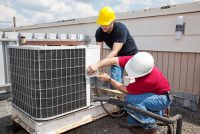Wildfires and Infections: Maintaining Good Indoor Air Quality
How is the air quality inside your offices or other facilities? Have you spoken recently with your building or facilities manager about your heating, ventilation, and air conditioning (HVAC) systems? Proper ventilation and air filtration can lower indoor concentrations of both infectious disease particles and particulate matter from wildfires, protecting your employees, customers, and visitors. […]










